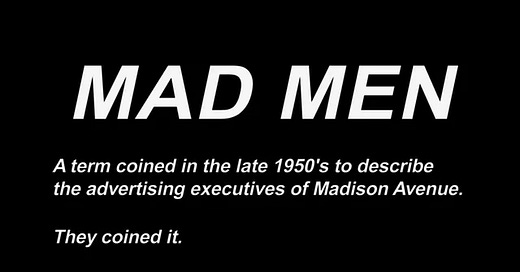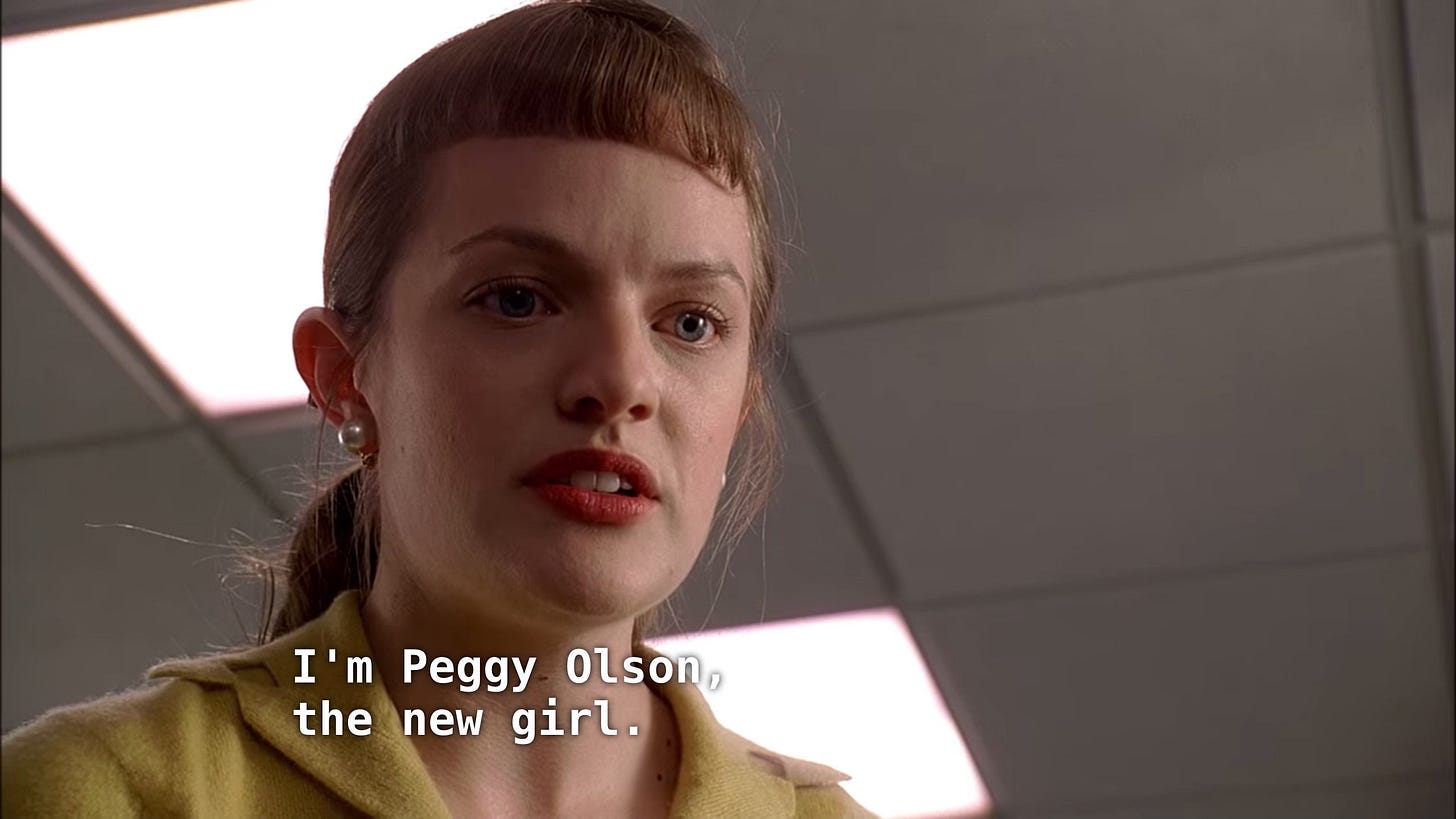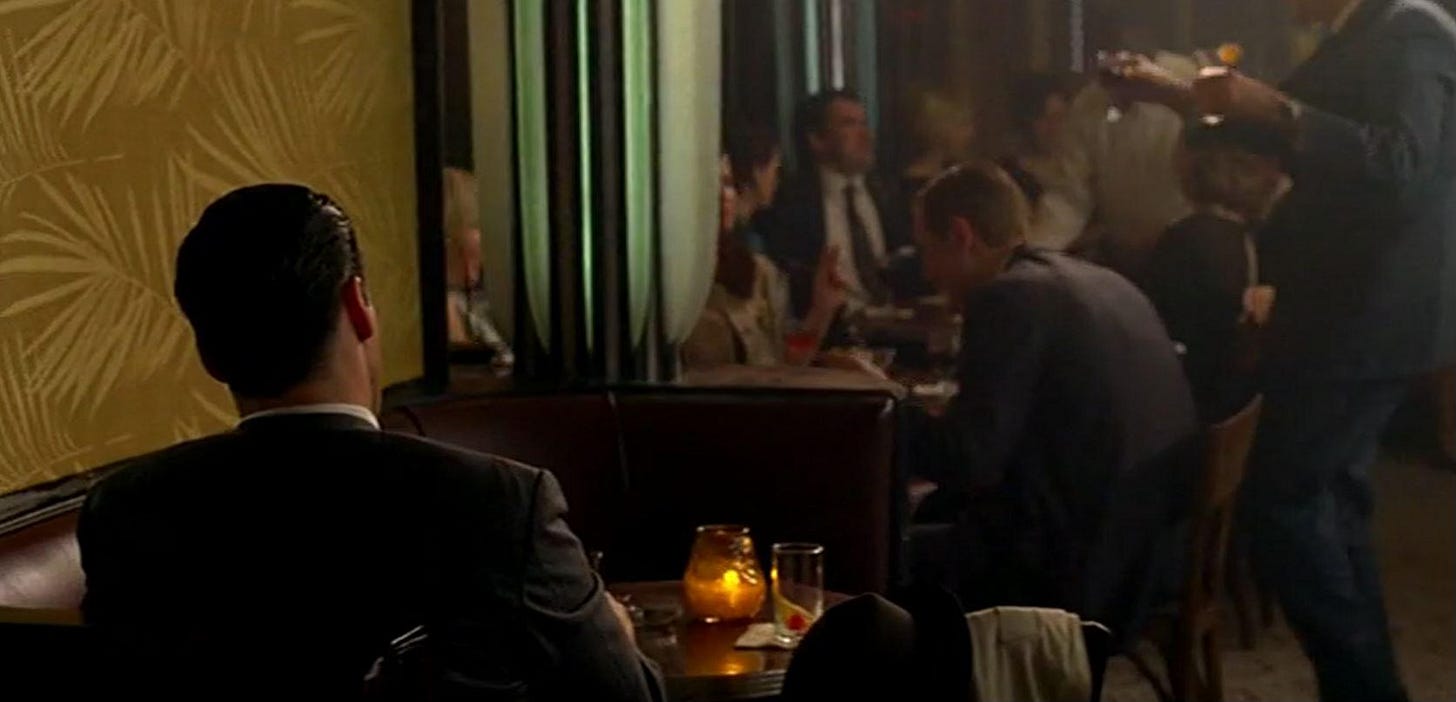The Carousel: Smoke Gets In Your Eyes
Starting off this series by thinking about characters, what they want, and the things that prevent them from realizing that. Also, cocktails.
Well, where else can we start but at the beginning and with one of the greatest TV pilots int he history of the medium: “Smoke Gets In Your Eyes,” which aired on July 19, 2007. This script is what Matthew Weiner showed to Sopranos creator and show runner David Chase to get on that famous television show’s writing staff.
The Pitch: "I'm in the tobacco business-- we're selling America."
The most famous part of this episode is obviously Don Draper’s pitch to Lucky Strike for the “It’s toasted” campaign:
We see the genius of Draper in this scene, in which he takes that negative (that these companies cannot say anything about health) and use it (and that no one else can make those claims too). It’s creating something out of nothing to make the product, in this case Lucky Strike, seem better and special.
Especially of note, for thinking about the whole enterprise of this show, is what he closes with :
Advertising is based on one thing: happiness. And do you know what happiness is? Happiness is the smell of a new car. It's freedom from fear. It's a billboard on the side of a road that screams with reassurance that whatever you're doing is OK. You are OK.
But that happiness, that desire, that’s the smoke that’s clouding so many eyes (not just what’s coming from all those Lucky Strikes). Peggy, Pete, and Don are all clouded by what they want.
Though this will be more explicitly explored in the upcoming episodes, Peggy’s desire to be a part of the “modern” world is clear. Though the appointment is set up by Joan, the fact that she gets a prescription for the contraceptive pill tells us that. Though she’s not “one of those girls,” as she says to Don, it’s clear she wants more out of life and one way this comes through is that she does invite Pete in when he drunkenly shows up at her apartment. The conceit of having one of our main characters be someone who is new to our show’s location is great too—it allows for us to get exposition but through that character’s eyes.
For Pete, he makes it clear what he wants is to be Don— not just the office and the title and the prestige, but the power. It’s interesting to think about what Don has that Pete wants and then what Pete has that Don wants (as we’ll learn, that blue-blood legitimacy and belonging within the important parts of America).
I think about the way Pete treats the girls who come to sit with him, Ken, Paul, and Harry at Pete’s bachelor party. He wants to feel powerful, to assert himself, but it’s clear that doesn’t work (the girl says “you’re hurting me” and then Pete says “I’ll be good”). It’s what makes that moment with Peggy stand out—this isn’t about "power” in that way. As he tells Peggy’s roommate, “for the first time today, I’m not selling anything.” If Pete can get past that desire to be the alpha, then perhaps there would be something meaningful he could find.
What Don is looking for is revealed in what Rachel Menken says to him at their rendezvous for drinks in which he apologies for being abrasive during their initial meeting.
Of course, this is what people most remember about that, are the lines delivered by Don:
The reason you haven't felt it is because it doesn't exist. What you call love was invented by guys like me, to sell nylons. You're born alone and you die alone and this world just drops a bunch of rules on top of you to make you forget those facts. But I never forget. I'm living like there's no tomorrow, because there isn't one.
But what Rachel says, to me, is much more interesting and, again, reveals what this show is really about:
I don’t know what it is you really believe in but I do know what it feels like to be out of place, to be disconnected, to see the whole world laid out in front of you the way other people live it. There’s something about you that tells me you know it too.
Rachel Menken understands that feeling of being on the outside, as both a woman in the world of business (and, honestly, just a woman in the world) and as a Jewish person in an America that was still evolving regarding its views towards Jewish people. But this idea of not belonging and seeing that life you want (or think you want)—the belonging—is something Don feels too. The smoke that Don has in his eyes, that’s clouding him, is that he thinks achieving that isn’t possible. He’s truly buying what he’s selling in terms of the “you’re born alone and you die alone” and “living like there’s no tomorrow” (how Nietzsche of him), but it’s holding him back. But what Rachel says about Don turns out to be so true and it’s fascinating watching over the course of the entire series as he grapples with that himself.
I also loved the wondering if Don’s secret was that he was actually Jewish and that was what he was hiding and thus this connection to Rachel Menken right at the beginning. I think the approach that Matthew Weiner took works though because that connection that Don is looking for and the way in which he feels like this outsider (I always think about the way Rachel says “disconnected”) transcends any one identity or belief system1.
Though I think the pilot sets Don up well for what we’ll get during the rest of the series, seeing his anxiety when he stops at Midge’s apartment in Greenwich Village does seem a bit out of place (or that’s something he’ll quickly move on from).
The Jukebox
While the opening “Band of Gold” is a great one and hints at the materialism that will be explored throughout the show: “Just want a little band of gold to prove that you are mine.” Also, the double-meaning/invocation of the band of gold as we think about the gold ring on a cigarette filter. But I want to highlight the show closing “On The Street Where You Live,” which is fitting as we close at the Draper’s home. Using a song written for the musical My Fair Lady, the Broadway musical at the time when Broadway was so closely associated with the status-quo middle/upper class. But also the lyrics can either be understood as the importance for Don of having that image of the successful ad man with the wife and kids and house in this specific kind of place. Or is it hinting at that longing to feel that powerful of a connection he could only achieve after shedding this image he’s built up for himself: People stop and stare, they don't bother me, for there's no where else on earth that I would rather be. Let the time go by, I won't care if I can be here on the street where you live.”
The Bar Cart
“Do this again. Old Fashioned, please.”
We see, in the first moments of the show, Don Draper ordered the cocktail that would be so closely associated with him—the Old Fashioned. Even before I watched the show, it was my go-to drink (I came by it naturally, as it’s my stepdad’s favorite drink and he taught me how to make them). Whiskey (bourbon or rye), bitters, sugar, club soda, and a garnish of orange and cherry, is one of the great drinks to have. It doesn’t dilute the liquor so much you don’t know what you’re drinking, but it makes it just different enough than if you drank the whiskey on the rocks.
The Five-Forty-Eight
It’s hard to avoid how much they’re telegraphing the Sal Romano being gay reveal— the neighbor who poses for his drawing, the over-the-top reaction to the prospect of getting female models in for a potential Lucky Strike ad, and the following lines/exchanges: “So we're supposed to believe that people are living one way and secretly thinking the exact opposite? That's ridiculous.”;
Because I came into the show after it had aired and knew a little bit about it, the whammy reveal at the end of the episode (that Don has this suburban New York home life with the beautiful young blond wife and children) wasn’t a big shock. I wonder/wish I knew if people felt surprised by that reveal or if they saw it coming
It’s interesting to see how some characters change pretty dramatically over the course of the show (Ken Cosgrove in particular), but Roger Sterling is who he is pretty much throughout the entire run (and that’s great, because he’s hilarious).
When Roger is describing working for the presidential campaign, we all thought he was referring to JFK right? At least I did until I, you know, learned about the relationship between business and the GOP/Nixon. But at first you’re thinking, “oh, this show about this genius advertising man, he’s going to work with Kennedy!”
Another great line by Roger: “Well, it looks like you're all going to engage in a little mid-level camaraderie, so I'll be on my way.”
There’s all the hints about Don’s past—that the Purple Heart falls out on the floor as though it doesn’t really matter and the way he recoils when Pete says, “A man like you I'd follow into combat blindfolded, and I wouldn't be the first. Am I right, buddy?”
Let me know what you think/what I missed/what you liked in the comments!
In our next installment, I’ll be considering Season 1, Episode 2: “Ladies Room” and really get into the character of Betty Draper.
At some point, I will enumerate the connections between Draper and the protagonist of Catholic and existentialist Walker Percy’s novel The Moviegoer, Binx Bolling.







I guess you'll get to it eventually but the Betty Draper character also underwent quite a tragic transformation -- miserable, repressed housewife, struggling with independence, and just as she begins to assert herself (returning to school, embracing feminism in her own way), she’s diagnosed with terminal cancer. Her arc highlights the suffocating roles women were often forced into back in those wily days, and how breaking free wasn’t always an option and even if you could, the real world waited behind the curtain...
Ken's character changes a lot, but I think Peggy is the one who goes through the most? We see that she knows what she wants early, but I'm thinking about that famous last scene at the end where she's wearing sunglasses, has a cigarette hanging out of her mouth, and is walking out of the office very much on her own terms. That's a million miles away from the "new girl" we see at the start of the series.
The music picks for each episode are fantastic, even if you don't notice them at first? I'm mindful that set design and music supervision are two differen things, but in this series, they seem one and the same. The only other show that does it on that level (IMO) is The Americans.
True story: I might be the only person in Wisconsin that's never had an Old Fashioned. I should probably change that, lol.